| Srl | Item |
| 1 |
ID:
130440
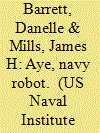

|
|
|
| 2 |
ID:
130354
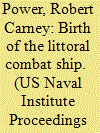

|
|
|
| 3 |
ID:
112185
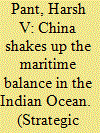

|
|
|
| 4 |
ID:
119132
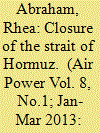

|
|
|
| 5 |
ID:
128789
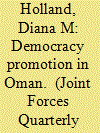

|
|
|
| 6 |
ID:
120174


|
|
|
|
|
| Publication |
2013.
|
| Summary/Abstract |
In "Protecting 'The Prize': Oil and the U.S. National Interest," Eugene Gholz and Daryl G. Press present an important counterargument to many common but overwrought worries about energy security. Yet they themselves go too far in the opposite direction. Gholz and Press argue that only three types of potential oil market disruptions could induce "particularly painful" adjustments and hence rise to the highest level: consolidation of a large fraction of Persian Gulf reserves under a single power, domestic instability in Saudi Arabia, and blockage of the Strait of Hormuz. I argue in this response that Gholz and Press confine the second and third scenarios too narrowly, and hence understate the security risks stemming from U.S. dependence on oil.
|
|
|
|
|
|
|
|
|
|
|
|
|
|
|
|
| 7 |
ID:
130397
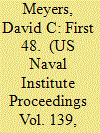

|
|
|
| 8 |
ID:
118884
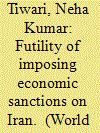

|
|
|
| 9 |
ID:
188168
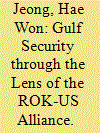

|
|
|
|
|
| Summary/Abstract |
An analysis of South Korea’s independent deployment of the Cheonghae Unit to the Strait of Hormuz sheds light on the fragmentation of media and political discourses in the country. Empirical evidence from five major South Korean newspaper outlets reveals that the South Korean government’s pre-emptive securitisation presents a wide gap in manifest and latent security interests between the state and society. Securitisation is debated with regard to the two interconnected questions of South Korea’s military deployment to the Middle East and the future of the Korean Peninsula – both of which are ultimately tied to the question of Seoul’s commitment to the US alliance.
|
|
|
|
|
|
|
|
|
|
|
|
|
|
|
|
| 10 |
ID:
117534
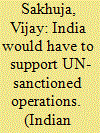

|
|
|
| 11 |
ID:
115894
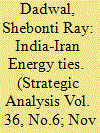

|
|
|
|
|
| Publication |
2012.
|
| Summary/Abstract |
This article looks at relations between Iran and India, with a focus on energy, in the past as well as currently. It will examine the state of the energy sector in Iran in light of the US-sponsored sanctions imposed on the Islamic Republic and the Iranian threat to close off the Strait of Hormuz to shipping. It will analyse what this portends for Iran's position in the international oil and gas market, and the impact this may have on larger India-Iran relations, given that energy is a core factor in their bilateral ties.
|
|
|
|
|
|
|
|
|
|
|
|
|
|
|
|
| 12 |
ID:
118122
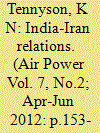

|
|
|
| 13 |
ID:
185303
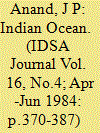

|
|
|
| 14 |
ID:
115426


|
|
|
| 15 |
ID:
187404


|
|
|
|
|
| Summary/Abstract |
The Strait of Hormuz has great significance for the world economy as an oil chokepoint. Yet in recent years, international navigation through the Strait of Hormuz has been repeatedly hampered and subject to discriminatory navigational restrictions and attacks. Such measures have been mostly aimed at oil tankers. This article examines the maritime incidents that occurred in the Strait of Hormuz in 2019: mine attacks against oil tankers and the arrest of an oil tanker by the Iranian armed forces. This study approaches these incidents from the perspectives of the law of the sea and from jus ad bellum.
|
|
|
|
|
|
|
|
|
|
|
|
|
|
|
|
| 16 |
ID:
176731


|
|
|
|
|
| Summary/Abstract |
Persian Gulf Countries (PGC) are collectively the world's largest exporter of fuels. The vast majority of these fuels are shipped via maritime routes and require transit through the Strait of Hormuz. As such, the Strait of Hormuz is considered the most important chokepoint for the global energy economy. This study examines the effect of maritime piracy through this chokepoint on exports of specific fuels from each PGC. We classify piracy as a soft restriction in the Strait; the effect of a such a restriction depends on the risk sensitivities of the trading countries and the type of fuel being traded. We use a two-stage least squares regression to first estimate the impact of piracy attacks on tanker traffic through the Strait, and then estimate the risk that the restriction would pose to energy exports. The first stage of the analysis reveals that tanker transit declines two years after piracy attacks. The second stage of the analysis, however, indicates that only refined petroleum exports from Bahrain and Kuwait are significantly impacted. We discuss drivers of this heterogeneity, including underlying market structures that allow crude oil to remain relatively resilient to soft restrictions. We then discuss policy implications of this risk to global energy security.
|
|
|
|
|
|
|
|
|
|
|
|
|
|
|
|
| 17 |
ID:
130314


|
|
|
| 18 |
ID:
113120
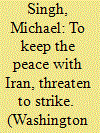

|
|
|
| 19 |
ID:
110088
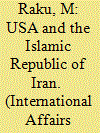

|
|
|
|
|
| Publication |
2011.
|
| Summary/Abstract |
EXPERT FORECASTS that international "peacekeepers" headed by the USA would take a break after Iraq and Afghanistan did not bear out. The "humanitarian operation" in Libya is drawing to a close, and Syria and Yemen are on deck. One wonders who will be next.
The Libyan drama involuntarily brings to mind the U.S. air strikes against Tripoli in 1986. They were followed by the U.S.-Iran armed conflict in the Persian Gulf in 1987-1988. What place do Western "scriptwriters" give Iran today? In view of the new escalation of the situation in the Greater Middle East, a retrospective analysis of the conflict between the U.S. and the Islamic Republic of Iran can be quite useful for assessing the overall situation in the region and possible development scenarios.
|
|
|
|
|
|
|
|
|
|
|
|
|
|
|
|